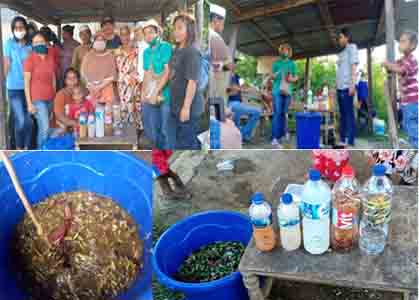Pelatihan pembuatan POC dari limbah rumah tangga
Training on making liquid organik fertilizer from household waste
DOI:
https://doi.org/10.46549/igkojei.v3i3.323Keywords:
Liquid Organik Fertilizer, Waste, Household, POC, Limbah, Rumah tanggaAbstract
ABSTRACT
The environmental conditions where residents live in Amban Village, West Manokwari District, Manokwari Regency, especially RT. 02 the majority are located in housing complexes which have a lot of limited land for farming so that people can only grow flowers or vegetables in pots. For plant fertilizers, they use chemical fertilizers, while organik waste, such as leftover fruits or vegetables, has not been utilized. The training aims to provide information, increase knowledge and skills of the community, especially housewives in the RT. 02 Amban Village, Manokwari Regency, West Papua Province, regarding the utilization of household organik waste or waste into liquid organik fertilizer. The training was conducted using lecture, discussion and practice methods. Overall, the training activities have been carried out in accordance with the plans and stages that have been set. Obtained organik fertilizer that is very beneficial for plants. The participants have understood and are able to make liquid organik fertilizer from household waste.
Keywords: Liquid Organik Fertilizer, Waste, Household
ABSTRAK
Kondisi lingkungan di Kelurahan Amban Distrik Manokwari Barat Kabupaten Manokwari, khususnya RT. 02 mayoritas berada dalam kompleks perumahan yang memiliki lahan terbatas untuk bercocok tanam sehingga masyarakatnya hanya bisa menanam bunga atau sayur-sayuran di pot. Untuk bahan penyubur (pupuk) tanaman mereka menggunakan pupuk kimia, sementara limbah organik seperti sisa buah-buahan atau sayur-sayuran, belum dimanfaatkan. Pelatihan bertujuan memberikan informasi, meningkatkan pengetahuan serta keterampilan masyarakat terutama ibu rumah tangga di RT. 02 Kelurahan Amban Kabupaten Manokwari Provinsi Papua Barat, mengenai pemanfaatan limbah atau sampah organik rumah tangga menjadi POC. Pelatihan dilakukan dengan metode ceramah, diskusi dan praktek. Secara keseluruhan kegiatan pelatihan telah terlaksana sesuai dengan rencana dan tahapan-tahapan yang sudah ditetapkan. Diperoleh pupuk organik yang sangat bermanfaat bagi tanaman. Para peserta telah memahami dan mampu membuat POC dari sampah rumah tangganya.
Kata kunci: POC, Limbah, Rumah Tangga
Downloads
References
Arifan F, Setyati Wa, Broto W, dan Dewi AL. 2020. Pemanfaatan Nasi Basi Sebagai Mikro Organisme Lokal (MOL) Untuk Pembuatan Pupuk Cair Organik di Desa Mendongan Kecamatan Sumowono Kabupaten Semarang. Jurnal Pengabdian Vokasi. 1(4): 252-255. DOI: 10.14710/jpv.2020.9187
Effendi. 2004. Pengantar Akuakultur, Jakarta: Penebar Swadaya.
Herman. 2000. Peranan dan prospek pengembangan komoditas kakao dalam perekonomian regional Sulawesi Selatan, Warta Pusat Penelitian Kopi dan Kakao. 1(1):21-31.
Hidayatullah R. 2012. Pemanfaatan Limbah Air Cucian Beras Sebagai Substrat Pembuatan Nata De Leri Dengan Penambahan Kadar Gula Pasir dan Starter Berbeda. Program Studi Biologi. Fakultas Sains Dan Teknologii. Universitas Islam Negri Sunn Kalijaga Yogyakarta
Indriani YH. 2004. Membuat Kompos Secara Kilat, Jakarta: Penebar Swadaya.
Manullang L. 2010. Karakterisasi Simplisia, Skrining Fitokimia Dan Uji Toksisitas Ekstrak Kulit Bawang Merah (Allium Cepa Bulbus Var Ascalonicum) Dengan Metode Uji Brine Shrimp (BST). Skripsi, Fakultas Farmasi. Universitas Sumatra Utara, Medan.
Marpaung KBdTR. 2014. Pemanfaatan POC dan Teknik. J. Hort. 24(1): 49-55.
Ramadhani D. 2010. Pengaruh pemberian bakteri asam laktat, bakteri fotosintetin anoksigenik dan bakteri pelarut fosfat terhadap pertumbuhan tanaman sawi (Brassica chinesis L var. Tosakan)," Naskah Skripsi S-1. Fakultas Matematika dan Ilmu Pengetahuan Alam, Universitas Sumatera Utara, Medan.
Susi K. 2009. Aplikasi Pupuk Organik Dan Nitrogen Pada Jagung Manis. Agritek, 17(6): 29-32.
Syafri R, Hilma R, Nst H, dan Pras P. 2017. Pelatihan Pembuatan POC Bagi Kelompok Tani Desa Kartama Pekanbaru. Jurnal Untuk Mu Negeri. 1(1): 13-18. DOI: 10.37859/jpumri.v1i1.28
Syamsiah S, Thayeb AM, dan Arsal AF. 2021. Pemanfaatan Limbah Buah dan Sayuran Sebagai Bahan Baku Pembuatan POC. Seminar nasional hasil pengabdian. ISBN: 978-623-387-015-3: 807-812
Syaprizal dan Rozi ZF. 2022. Pelatihan Pembuatan POC Dari Limbah Sayuran Di Desa Pagar Ayu Kecamatan Megang Sakti Kabupaten Musi Rawas. Jurnal Cemerlang. 4(1): 318 - 326 . DOI: 10.31540/jpm.v4i2.1635

Downloads
Published
How to Cite
Issue
Section
License
Copyright (c) 2022 Bertha Ollin Paga', Risma U. Situngkir

This work is licensed under a Creative Commons Attribution-NonCommercial-ShareAlike 4.0 International License.
License and Copyright Agreement
In submitting the manuscript to the journal, the authors certify that:
- They are authorized by their co-authors to enter into these arrangements.
- The work described has not been formally published before, except in the form of an abstract or as part of a published lecture, review, thesis, or overlay journal. Please also carefully read IGKOJEI: Jurnal Pengabdian Masyarakat Posting Your Article Policy at https://journal.fapetunipa.ac.id/index.php/igkojei/policy/publicationethics
- That it is not under consideration for publication elsewhere,
- That its publication has been approved by all the author(s) and by the responsible authorities – tacitly or explicitly – of the institutes where the work has been carried out.
- They secure the right to reproduce any material that has already been published or copyrighted elsewhere.
- They agree to the following license and copyright agreement.
Copyright
Authors who publish withIGKOJEI: Jurnal Pengabdian Masyarakat agree to the following terms:
- Authors retain copyright and grant the journal right of first publication with the work simultaneously licensed under a Creative Commons Attribution License (CC BY-NC-SA 4.0) that allows others to share the work with an acknowledgment of the work's authorship and initial publication in this journal.
- Authors are able to enter into separate, additional contractual arrangements for the non-exclusive distribution of the journal's published version of the work (e.g., post it to an institutional repository or publish it in a book), with an acknowledgment of its initial publication in this journal.
- Authors are permitted and encouraged to post their work online (e.g., in institutional repositories or on their website) prior to and during the submission process, as it can lead to productive exchanges, as well as earlier and greater citation of published work.

This work is licensed under a Creative Commons Attribution-NonCommercial-ShareAlike 4.0 International License.






